You may have heard of adaptogens and their incredible ability to protect our bodies from the harmful effects of stress while supporting overall health. You might even be keen to add adaptogens to your daily latte, morning elixir, superfood smoothie, or medicinal nightcap. But as a newbie, where do you begin?
First, what are adaptogens?
Adaptogens are pretty amazing plants that tend to grow in the most inhospitable areas of the earth: high deserts, cold mountains, dry and barren land. In these harsh conditions, they develop amazing resiliency to survive their environmental stressors. Lucky for us, when we consume these plant medicines, we improve our own ability to deal with the stress of our internal and external environments.
Adaptogens don’t serve a single function; instead, they adapt to whatever the body is dealing with and help alleviate or lessen the symptoms. So whether you’re feeling frazzled and anxious or foggy-headed and lethargic, adaptogens seem to help.
Below is a guide to some of the most popular adaptogens, each with its own special set of skills. Regarding how much and how often to take them, I recommend small amounts consistently, e.g., half a teaspoon daily, as the effects of adaptogens are subtle and felt over the long term.
Ashwagandha
One of Ayurveda’s most highly acclaimed adaptogens, ashwagandha is a potent antioxidant and was traditionally prescribed to boost the immune system after illness. Its name is translated as “the strength of ten horses,” making it excellent for enhancing athletic performance, endurance, and exercise recovery [source].
Ashwagandha also supports optimal thyroid [source] and adrenal function. It’s a great herb for helping the body withstand stress [source], balancing mood, and supporting an overall sense of well-being.
Serving suggestion:
Add ½ teaspoon of Ashwagandha powder to warm water, tea, lattes, or smoothies, or try taking it in capsule form.
Ginseng
There are various ginseng species, but the ones we are discussing here—Asian White, Asian Red, and American White—belong to the genus Panax, which means “all heal.”
Ginseng boosts the immune system [source] and increases overall energy without caffeine jitters, making it an excellent herb for jet lag! It also improves mood and concentration and acts as a natural appetite suppressant.
Serving suggestion:
Make ginseng tea with the fresh root or by using ginseng tea bags.
Eleuthero
Also known as Siberian ginseng, eleuthero is a remarkable herb with energy-enhancing and brain-boosting benefits [source]. Eleuthero reduces the effects of stress on the body, improves mental and physical stamina, and fights fatigue.
It’s the perfect energy booster without the harmful effects of stimulants. Siberian ginseng boosts memory, improves focus, alertness, and mental clarity. It can help you stay clear-headed under pressure.
Serving suggestion:
You can take eleuthero capsules or use it in powdered form.
Pine Pollen
Turns out the pollen from pine trees is a mega source of bioavailable vitamins and minerals and a very energizing adaptogen! Pine pollen’s claim to fame is the androgenic effect it has on the body. Androgens are the sex hormones we associate with “manhood.”
If you’re a woman, don’t stop reading—you need testosterone too! Women with low testosterone levels often experience chronic fatigue, low libido, difficulty building lean muscle, and a decreased sense of well-being. Pine pollen is also known as a potent aphrodisiac!
Serving suggestion:
Mix ½ teaspoon of Pine Pollen in water, tea, or a smoothie.
Rhodiola
Rhodiola is regarded as a powerful Tibetan brain tonic. It appears to stimulate dopamine and serotonin in the brain [source], which promotes mental clarity, focus, and a balanced mood [source]. Rhodiola is also a great herb for increasing energy, vitality, and stamina [source] while working to lower elevated cortisol levels related to chronic stress and burnout [source].
One of the best things about Rhodiola is that it can help you burn belly fat by turning on an enzyme called hormone-sensitive lipase that tells your body to burn stored fat as fuel. Studies in animal models show that it got rid of binge eating and the increased level of stress hormones related to it [source]. And Rhodiola can enhance endurance exercise as well [source]!
Serving suggestion:
It can be taken as a supplement in capsule form or as a powder added to water or tea.
Moringa
Also known as the “Miracle leaf or tree,” moringa improves overall nutrition due to its wide range of bioavailable vitamins (A, B, and C) and minerals (potassium, calcium, iron, and magnesium) [source]. It is commonly used to make moringa tea, which has many medicinal applications such as strengthening digestion, regulating blood sugar levels, stabilizing blood pressure, and promoting better sleep.
Moringa leaves have also been shown to increase milk production in breastfeeding mothers. It does have some negative effects in patients with diabetes and in pregnancy or those attempting to conceive, and it shouldn’t be taken in large doses [source].
Serving suggestion:
Add the powder to hot water to make moringa tea. Otherwise, it can be added to other beverages, including smoothies.
Maca
Maca root is a relative of the cruciferous veggie family, which includes broccoli, cabbage, etc. This nutrient-rich root has been consumed in regions of the Andes Mountains for thousands of years for its energy-boosting, libido-enhancing, and hormone-balancing benefits. As an adaptogen, maca can help restore endocrine health.
For women, it is often used in the treatment of PMS, menopause [source], and rebuilding hormones post-Pill. For men, maca has been shown to have positive effects on male fertility by improving sperm production [source]. You can find maca powder in the raw form or gelatinized. It is higher in enzymes and nutrients when taken in the raw form, while gelatinized (cooked) is easier to digest.
Serving suggestion:
I like adding a spoonful of maca powder to my morning smoothies or try adding maca to hot chocolate.
Pearl
Pearl is exactly what you think it is—a powder made from finely ground pearls. Loaded with enzymes, amino acids, and essential minerals, pearl is a beautifying and anti-aging antioxidant powerhouse that helps nourish skin, hair, and nails for an overall glow.
Serving suggestion:
Add pearl powder to water, tea, or smoothies. This iced pearl latte is perfect for warm weather!
Mucuna pruriens
Mucuna pruriens is an Ayurvedic “building” plant used to balance the nervous, reproductive, and digestive systems. As a good source of L-dopa [source], which is the precursor to the neurotransmitter dopamine, Mucuna pruriens elevates mood and focus while keeping you calm during your busy day.
This herb is revered as one of the best reproductive tonics for men and women as it supports normal fertility, healthy sperm and ova, and bolsters libido. Mucuna pruriens can also help foster healthy digestive function and proper elimination [source].
Serving suggestion:
Take Mucuna pruriens in capsule form or add the powder to water, tea, nut milk lattes, or smoothies. It has a mild caramel flavor!
Schisandra Berry
Schisandra berry is a potent antioxidant and inflammatory that improves digestive health [source], making it a wonderful tool for gentle daily detoxification. Due to its anti-inflammatory benefits, Schisandra is considered a beauty tonic that brings suppleness to the skin, protects against photoaging [source], and adds shine to the hair.
This health-promoting berry increases energy, promotes mental clarity, and heightens concentration. It is also famous for increasing sexual function and stamina.
Serving suggestion:
Add Schisandra powder to water, tea, or smoothies.
Astragalus
Common in many traditional Chinese medicine herbal formulations, astragalus is prized as an immunomodulator, meaning that it helps make the immune system more effective without causing it to become overactive.
Astragalus fights inflammation and free radical damage. Its anti-aging and circulation-boosting capabilities make astragalus excellent for skin health [source].
With high levels of antioxidants, studies have also shown its ability to protect the cardiovascular system by preventing arterial plaque buildup, reducing blood pressure, and lowering triglyceride levels [source].
Serving suggestion:
Add Astragalus powder to water, tea, or soup.
Shilajit
Known in Ayurveda as the “rejuvenator,” [source] Shilajit is touted as the best carrier of energy and nutrition into the human body. It is a black, tar-like goo that exudes out of deep fissures in the rocks of the Himalayas. This unique, mineral-rich substance is loaded with nutrients such as trace minerals, electrolytes, fatty acids, silica, probiotics, and prebiotics.
These nutrients improve gut health, boost digestion and detoxification, lower inflammation, fight free radical damage, improve energy levels, and aid in cognition [source].
Serving suggestion:
Take it as a supplement in capsule form or as part of a blend in Moon Juice’s Sex Dust and Brain Dust.
Tulsi (Holy Basil)
Called the “Elixir of Life” in Ayurveda, tulsi is one of nature’s most powerful and sacred herbal medicines. Tulsi is also known as Holy Basil [source] and can heal the skin both internally and externally. It supports the health of beneficial microbes in the gut and can be used as a natural acne treatment.
Tulsi is famous for supporting respiratory health as it helps to provide relief from congestion by encouraging expectoration of mucus from the lungs and respiratory tract. It also has the ability to regulate blood sugar and help the immune system deal with stress [source].
Serving suggestion:
For me, a cup of Organic India Tulsi tea is the perfect way to get through that mid-afternoon slump without sugar cravings or brain fog! Or try this morning elixir as a coffee alternative.
Medicinal Mushrooms
A handful of adaptogenic mushrooms have pretty incredible health benefits, including cordyceps, reishi, shiitake, chaga, lion's mane, and turkey tail. To learn more, check out this post, all about medicinal mushrooms.
How to Make Adaptogen Drops
Sure, you can buy supplements but why not make your own? Here's how to make your won adaptogen drops when you need a moment of zen. You can also make your own adaptogenic brain moon dust!
We used several different calming herbs: ginseng, holy basil, lemon balm and ginger. Ginseng and holy basil are both powerful adaptogens that can help fight fatigue, lower stress, and balance hormones.
Lemon balm is a soothing herb that has been used for centuries to promote sleep. And while ginger does not affect anxiety directly, it can help calm an overactive mind.
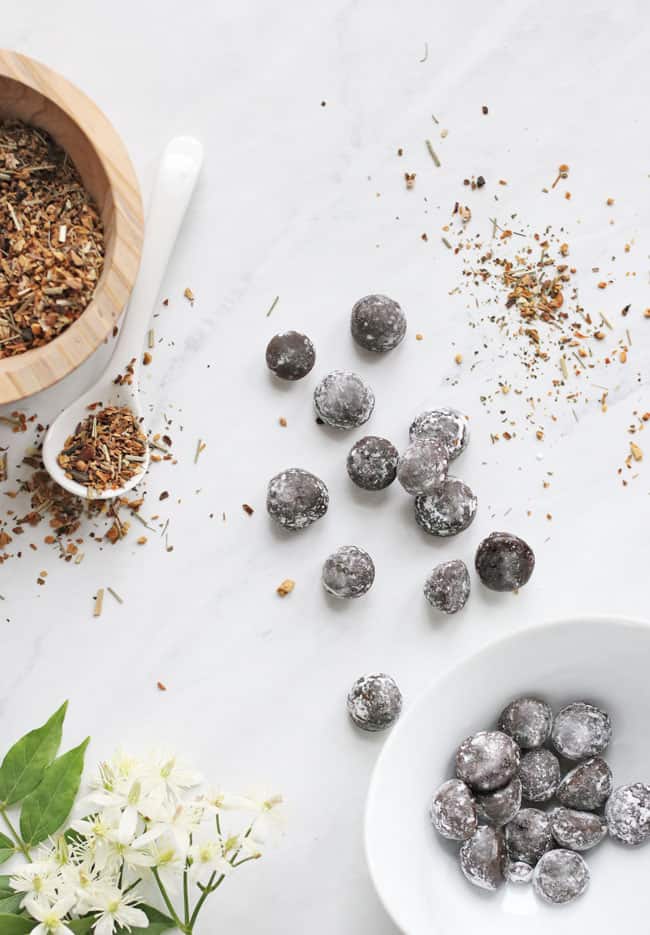
Then combine this tea with honey and bring the mixture to a boil. Once the water has boiled away, the honey will thicken until it becomes a caramel consistency. It’s helpful to have a candy thermometer so you can tell when the temperature reaches 300 degrees.
But if you don’t, spoon a little bit of the mixture into a glass of cool water and see if it hardens. If not, keep simmering and testing periodically until it does.
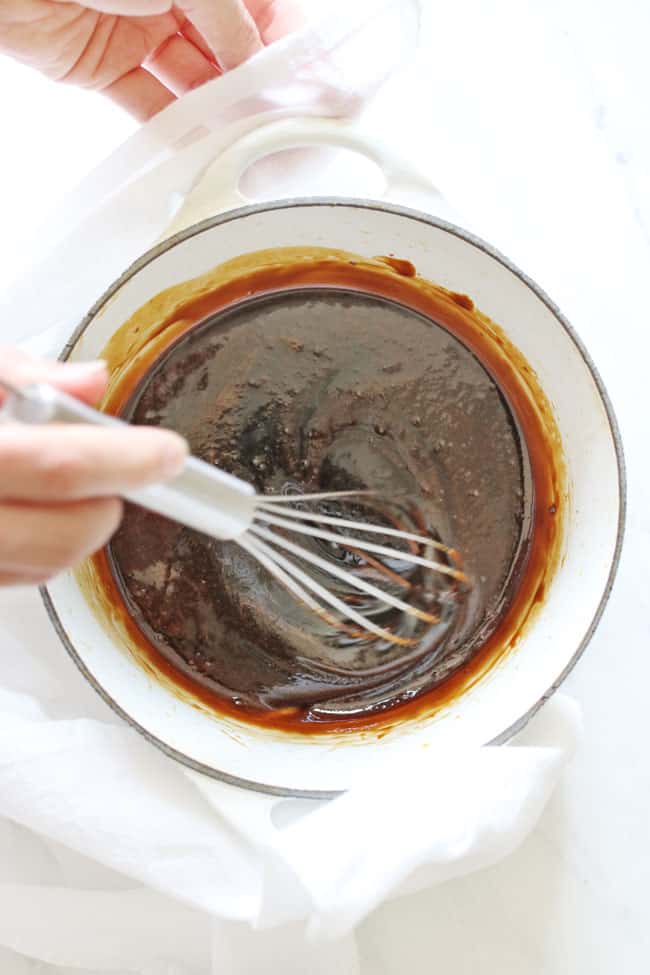
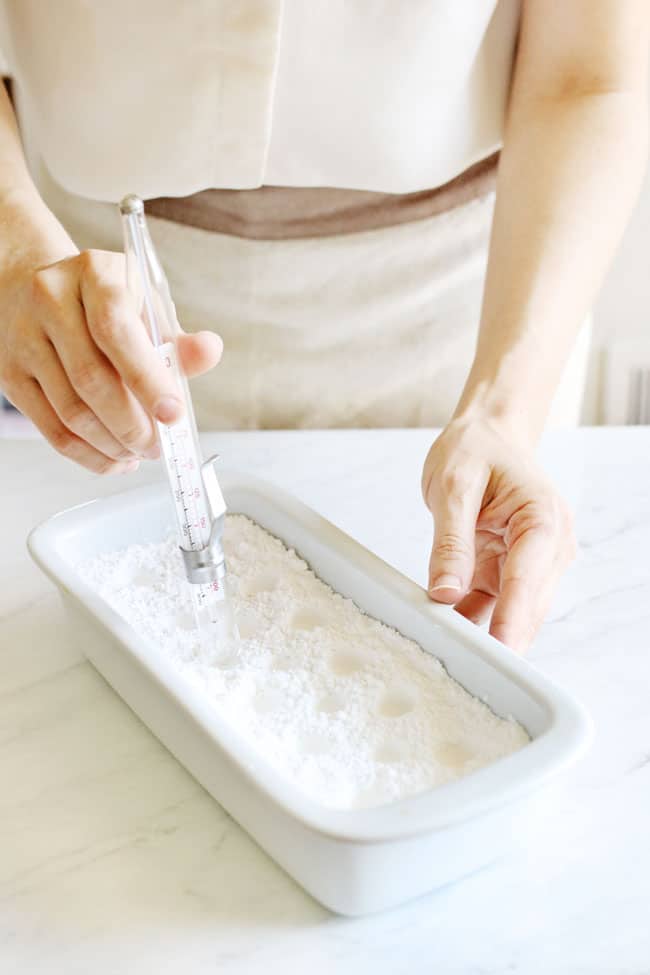
Once they have cooled completely, dust off the powdered sugar and store in a portable tin.
📖 Recipe
Adaptogen Drops
Equipment
- Small saucepan
- Strainer
- Medium saucepan
- silicone candy molds
Ingredients
- 1 tablespoon each: ginseng, holy basil, lemon balm and ginger (fresh or dried)
- 1 cup boiling water
- 1 cup honey
- 1 lemon juiced
- 2-4 cups powdered sugar optional
Instructions
- Combine the herbs in the cup of boiling water and let steep for 10 minutes.
- Strain the herbs from the tea. Pour the tea into a medium sauce pan and add the honey.
- Turn the stove to medium and bring to a boil. You’ll need to keep an eye on the pan to make sure the honey mixture doesn’t boil over or burn. Stir regularly.
- After about 10 minutes, start testing the temperature. You want to wait until the honey reaches 300 degrees or it won't harden properly. If you don't have a candy thermometer, simply drop a small spoonful of the mixture into a glass of cool water. If it hardens completely (it should be crunchy, not slightly chewy) it's ready. At first I used a small pan and the honey never got hot, but once I transferred the mix to a large pan it started heating up a lot faster, so you'll need to watch it closely.
- Remove the honey from the burner and work quickly to spoon the mixture into your molds.
- Let cool for 30 minutes to an hour. Then dust off the powdered sugar and store in an airtight container.
- To use, simply eat a drop whenever you start feeling stressed or need to unwind.
Notes
This post was medically reviewed by Dr. Holly Smith, a board-certified physician in nephrology and internal medicine with a background in nutrition. Learn more about Hello Glow's medical reviewers here. As always, this is not personal medical advice, and we recommend that you talk with your doctor.
73
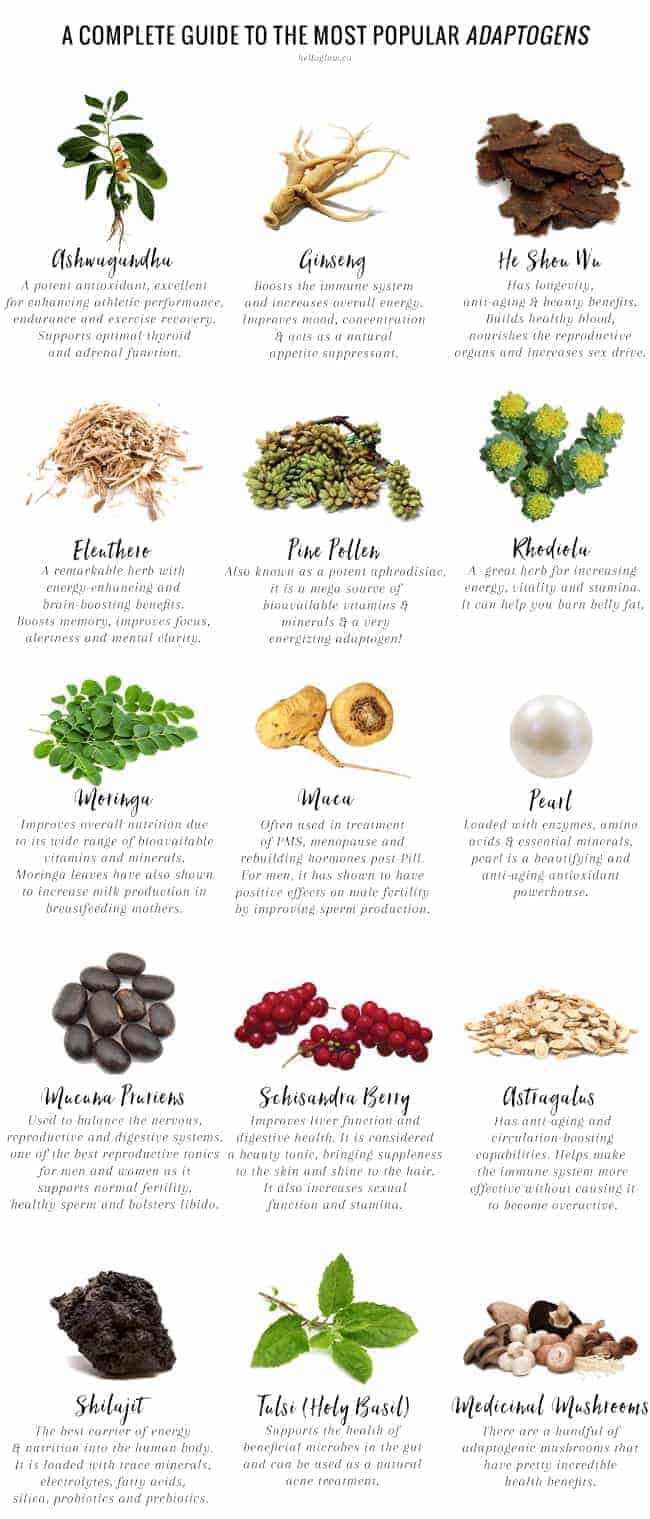
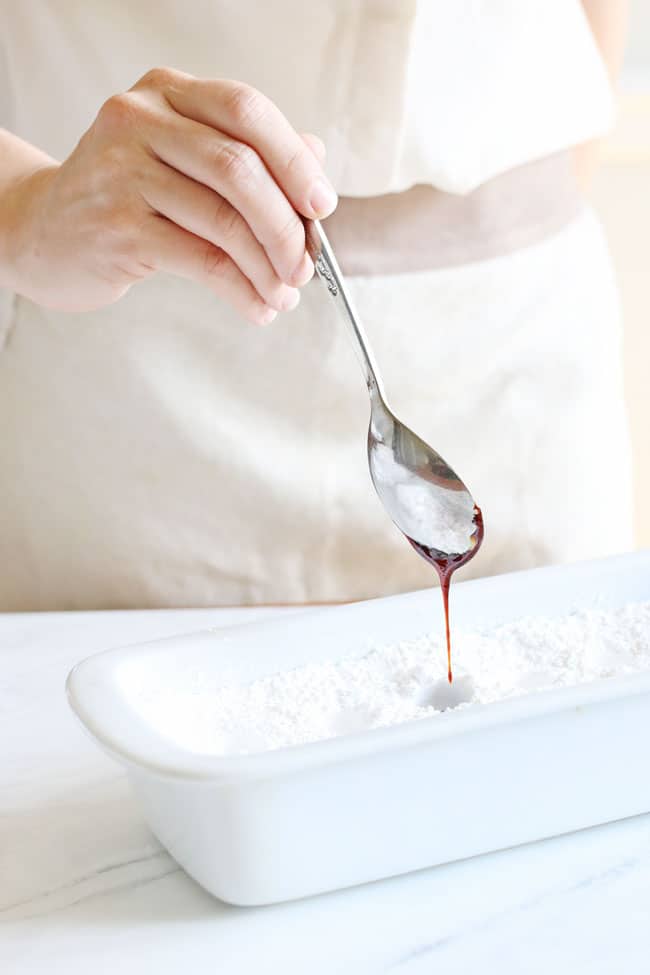
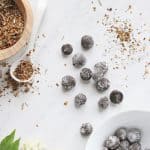
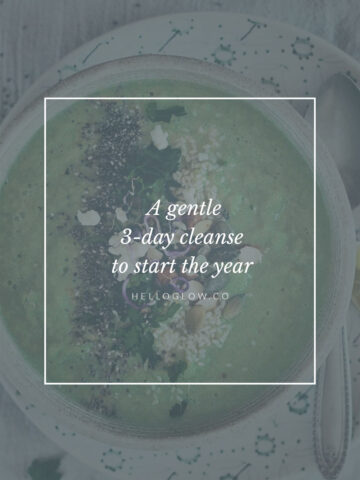
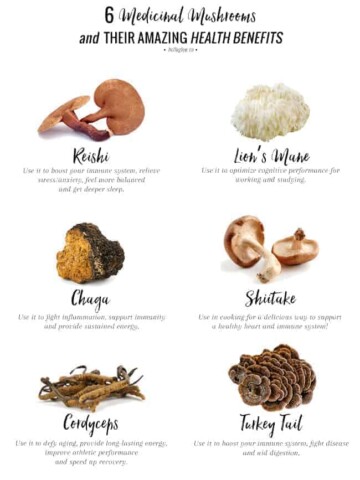
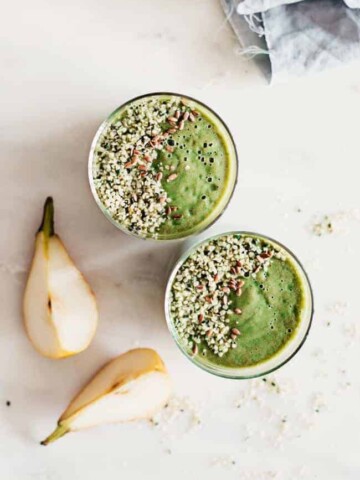
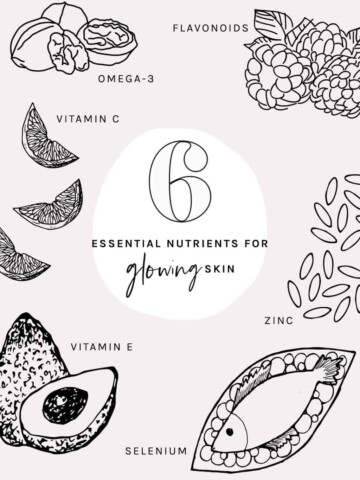
terry Lemoine says
I enjoyed reading your info on natural Adaptogens. The only one I have first-hand with is Maca, which I have taken as a supplement for years, and so has just about everyone I know, because I recommended Maca to them. It's an amazing plant! I recently retired, and started a website, and now I am dedicating my time to offering info to anyone who's interested on the incredible wide-ranging health and wellness benefits of Maca. If you have time, checkout my site and let me know what you think. Look forward to hearing from you. Thanks, Terry
Skye says
Is there a vegan alternative to the pearls?
Alison says
Does maca powder need to be consumed everyday to gain the benefits? Or is it okay if you use it, say, every other day? Thanks! :)
Zeba says
Is there a plant/ adaptogen in there that can help someone with pollen allergies?
liza says
CONSUME SOME POLLEN EVERYDAY!!!! MY MOTHER DID THIS TO CURE HER CRIPPLING POLLEN ALLERGIES, START LOW AND INCREASE SLIGHTLY. If you have any internal allergic reaction (shouldn't happen but stating just in case) stop use obviously. But i recommend this to everyone.
Susan says
I have heard that it's beneficial to consume local honey. The bees make it from local pollen so it gives your immune system a chance to get used to it. Honey also has propolis which helps boost your immune system.
Susanne says
Great information. I want to take them all!